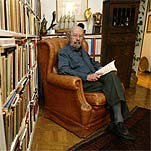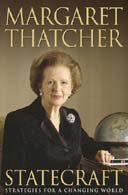Tips for getting the best out of long, dull books
Today marks the end of my first six months as a blogger. 27 Sunday blogs. At least 30,000 words of text, probably more.
Has it been worth the effort? Would the time have been better spent writing fiction?
Impossible to say at this stage. I've enjoyed it. My presentation skills have improved, although they're still far from perfect. So far not many people have hit the Comment button, but I'm receiving approving private emails and the statistics supplied by Blogger indicate a steadily increasing readership. So the plan is to carry on to the end of April and then review the situation.
Babelia book supplement
The picture of Spanish author and poet Don José Maria Caballero Bonald in his house in Madrid caught my eye on the front page of the Babelia book supplement of Mr Bookworm's copy of El Pais, one of Spain's leading newspapers. You might like to have a browse through it.

Nuggets of interest in a political tome
"What on earth made you borrow that?" asked Mr Bookworm when he saw Margaret Thatcher's Statecraft : Strategies for a Changing World among the four paperbacks I had borrowed from the "library" I mentioned last Sunday.
What indeed? I take a cynical view of all politicians. So why did I borrow this book described by the HarperCollins blurb-writer as "a powerful treatise delivered by a world figure with a unique combination of principle and shrewdness"?
Out of curiosity to see whether it was readable, I suppose. It seemed unlikely that I should agree with Michael Fry whose comment in The Scotsman, "A pleasure to read - clear, cogent and coherent" is among the praise for the book on the back cover.
What was immediately obvious from the Acknowledgments was that many people [all men ] had had a finger in this massive pie. In the Introduction, a book published in 1910 by a Nobel Prize-winning economist Norman Angell is quoted. I wondered if Margaret Thatcher had read it, or if it had been included at the suggestion of one of her literary advisers.
A bad hair day
By the end of the long Introduction, I knew I wasn't going to plough through the next 471 pages so I followed a useful tip for dealing with long, dull books shared by a book critic years ago. "Read the index," he advised. I read the index and inserted four slips from a Post-it note on pages 12, 45, 243 and 426. Each time the book's cover photograph caught my eye on the large kitchen table where a lot of our reading is done, I wondered why a woman as clever as Lady Thatcher - she read chemistry at Oxford and later specialised in tax law - did not realise there is a time in life when dyed hair looks wrong, particularly when dyed a uniform and unflattering reddish-brown.
On page 12 of Statecraft, a number of famous writers - George Bernard Shaw, H G Wells, Harold Laski and Sidney and Beatrice Webb are castigated for being impressed by the Soviet Union.

On page 45, I read "When it was recognised that women cannot throw ordinary grenades far enough to avoid being caught in the explosion, the answer was not to let men take over but rather to make lighter (and less lethal) grenades. When it was discovered that women on board warships require facilities that men do not, the US Navy had to 'reconfigure' their ships to provide them - on the USS Eisenhower alone that cost $1 million…Women have plenty of roles in which they can serve with distinction: some of us even run countries. But generally we are better at wielding the handbag than the bayonet."
Well, I agree with her there. I was also interested to read, on page 243, her views on the Israel/Palestine situation, but there was no reference to an aspect of that long drawn out conflict which I had hoped might be mentioned.
Surprise, surprise…Woman's Own indexed
Who would expect to find Woman's Own mentioned on page 426 in a book on statecraft? The reason is an interview Lady Thatcher gave to the magazine which "stirred up a hornets' nest".
She writes : "There are a number of things I have said in my political life which I would have liked to rephrase. These words are not among them. Yet they caused a furore. 'No Such Thing as Society' is still quoted (out of context, naturally) by left-wing politicians, journalists and occasional clerics to sum up what they think was wrong with the 1980s, and what is still wrong with 'Thatcherism'."
The ten worst things ever said to you
I have several novels by American writer Jenny Crusie on my shelves and on Thursday read an excellent article by her advising people new to writing to analyse themselves and their expectations before starting out in an increasingly difficult profession/trade/craft.
It's all first class advice apart from the following three sentences.
"Make a list of the ten worst things anybody has ever said to you. Why were those things so devastating? How can you protect yourself from that kind of experience?"
In my view anyone who can remember the ten worst things anyone has ever said to them has to have a serious psychological problem. I can't remember the last unpleasant thing someone said to me, let alone the last ten.
But although Jenny Crusie comes over as a down to earth, sensible woman, Americans in general do tend to analyse themselves, and to go to shrinks, more than Brits do. Actually, in view of the present Political Correctness pandemic, I'm surprised there's anyone left who dares to express an even mildly critical opinion about anyone or anything. On various online forums I subscribe to, there are seldom, if ever, any rousing ding-dong arguments and members are careful to qualify their views with "only IMO [in my opinion] of course" and similar apologetic postscripts.

The photograph of Ms Crusie is borrowed from the site of the Ohioana Library Association whose mission is "to recognize and encourage the creative accomplishments of Ohioans, to preserve and to expand a permanent archive of books, sheet music, manuscripts, and other materials by Ohioans and about Ohio, and to disseminate information about the work of Ohio writers, musicians, and other artists to researchers, schools, and the general public."
What an excellent idea. If only all libraries had similar missions.
Finally, thank you Adrian Weston for an interesting comment on last Sunday's piece about Mary Wesley.
